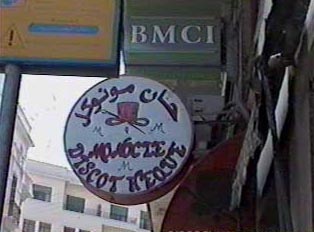LangMedia
French in Morocco
Entertainment

Moroccan cities are full of opportunities for those wanting to enjoy the night life. For a younger crowd, there are small clubs where alcohol is served. One will be asked for identification if obviously much younger than the drinking age of 18. Otherwise, the drinking age is not enforced, and there is no age limit for someone purchasing alcohol at the store. Clubs feature DJ’s and dancing and are generally open from around 12:00 midnight to 5:30-6:00 a.m. Clubs play a mixture of music ranging from European to American to Moroccan to a blend of Moroccan-French-English. For those wanting to go out before the dance clubs open, there are pubs where one can meet friends for a drink and a bite to eat until around midnight when they close. For an older crowd, a typical weekend night would be to dine out first, then to gather at someone’s home for an evening of drinks, tapas, and conversation.
Cafés provide a spot to relax with friends throughout the day and evening. One can play cards, enjoy soccer on TV or simply watch people. No alcohol is served, but rather coffee, hot chocolate and tea. There are pastries, crepes and other light snacks to eat. A traveler should ask a Moroccan friend for a suggestion as to the appropriate cafés, since some cafés are more or less reserved for the older men in the neighborhood.
Movies are very popular; theatres are generally located at the malls. There, one can see Moroccan, European and American movies, although the American films sometimes arrive in Morocco rather late. For art lovers, various cities feature galleries where contemporary art is both exhibited and sold.
Favorite national sports are soccer, volleyball, and basketball. Golf and tennis are reserved for the more well-to-do who can afford to play at country clubs. Everybody takes vacation at the beaches where one can rent jet skis and water bikes or simply sunbathe and swim. Beaches remain open throughout the year, although the weather only permits swimming from March to September. However during winter, cafés on the beach remain open.
Traditional forms of entertainment endure, such as the hiring of music ensembles and belly dancers to perform at weddings and other significant events. Gnawa, a traditional form of dancing described below, is often seen at weddings or performed by dancers on the street for money.
One of the more extraordinary aspects of life in Morocco is the series of yearly festivals that take place throughout the country. These regional festivals are held to celebrate an essential aspect of life in that particular region. For instance, there is an almond blossom festival; a wax lantern festival; a festival of fiances; a festival celebrating gnawa, a ritual of music and dance which is derivative of both Islam and the rites of African slaves imported three centuries ago. There are festivals celebrating cherry, olive and rose harvests in various regions as well as a famous yearly festival of jazz in Tangiers.
Videos
-
"What Have You Been Up To?"Transcript document:
-
"What Do You Do With Your Days?"Transcript document:
